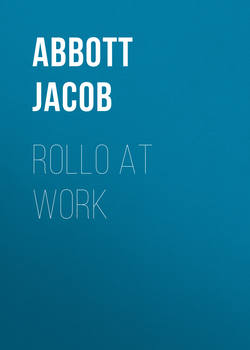Читать книгу Rollo at Work - Abbott Jacob - Страница 11
The Two Little Wheelbarrows
The Old Nails
ОглавлениеThe next morning, after breakfast, Rollo's father told him he was ready for him to go to his work. He took a small basket in his hand, and led Rollo out into the barn, and told him to wait there a few minutes, and he would bring him something to do.
Rollo sat down on a little bundle of straw, wondering what his work was going to be.
Presently his father came back, bringing in his hands a box full of old nails, which he got out of an old store-room, in a corner of the barn. He brought it along, and set it down on the barn floor.
“Why, father,” said Rollo, “what am I going to do with those old nails?”
“You are going to sort them. Here are a great many kinds, all together. I want them all picked over—those that are alike put by themselves. I will tell you exactly how to do it.”
Rollo put his hand into the box, and began to pick up some of the nails, and look them over, while his father was speaking; but his father told him to put them down, and not begin until he had got all his directions.
“You must listen,” said he, “and understand the directions now, for I cannot tell you twice.”
He then took a little wisp of straw, and brushed away a clean place upon the barn floor, and then poured down the nails upon it.
“O, how many nails!” said Rollo.
His father then took up a handful of them, and showed Rollo that there were several different sizes; and he placed them down upon the floor in little heaps, each size by itself. Those that were crooked also he laid away in a separate pile.
“Now, Rollo,” said he, “I want you to go to work sorting these nails, steadily and industriously, until they are all done. There are not more than three or four kinds of nails, and you can do them pretty fast if you work steadily, and do not get to playing with them. If you find any pieces of iron, or any thing else that you do not know what to do with, lay them aside, and go on with the nails. Do you understand it all?”
Rollo said he did, and so his father left him, and went into the house. Rollo sat down upon the clean barn floor, and began his task.
“I don't think this is any great thing,” said he; “I can do this easily enough;” and he took up some of the nails, and began to arrange them as his father had directed.
But Rollo did not perceive what the real difficulty in his task was. It was, indeed, very easy to see what nails were large, and what were small, and what were of middle size, and to put them in their proper heaps. There was nothing very hard in that. The difficulty was, that, after having sorted a few, it would become tedious and tiresome work, doing it there all alone in the barn,—picking out old nails, with nobody to help him, and nobody to talk to, and nothing to see, but those little heaps of rusty iron on the floor.
This, I say, was the real trouble; and Rollo's father knew, when he set his little boy about it, that he would soon get very tired of it, and, not being accustomed to any thing but play, would not persevere.
And so it was. Rollo sorted out a few, and then he began to think that it was rather tiresome to be there all alone; and he thought it would be a good plan for him to go and ask his father to let him go and get his cousin James to come and help him.
He accordingly laid down the nails he had in his hand, and went into the house, and found his father writing at a table.
“What is the matter now?” said his father.
“Why, father,” said Rollo, “I thought I should like to have James come and help me, if you are willing;—we can get them done so much quicker if there are two.”
“But my great object is, not to get the nails sorted very quick, but to teach you patient industry. I know it is tiresome for you to be alone, but that is the very reason why I wish you to be alone. I want you to learn to persevere patiently in doing any thing, even if it is tiresome. What I want to teach you is, to work, not to play.”
Rollo felt disappointed, but he saw that his father was right, and he went slowly back to his task. He sorted out two or three handfuls more, but he found there was no pleasure in it, and he began to be very sorry his father had set him at it.
Having no heart for his work, he did not go on with alacrity, and of course made very slow progress. He ought to have gone rapidly forward, and not thought any thing about the pleasantness or unpleasantness of it, but only been anxious to finish the work, and please his father. Instead of that, he only lounged over it—looked at the heap of nails, and sighed to think how large it was. He could not sort all those, possibly, he said. He knew he could not. It would take him forever.
